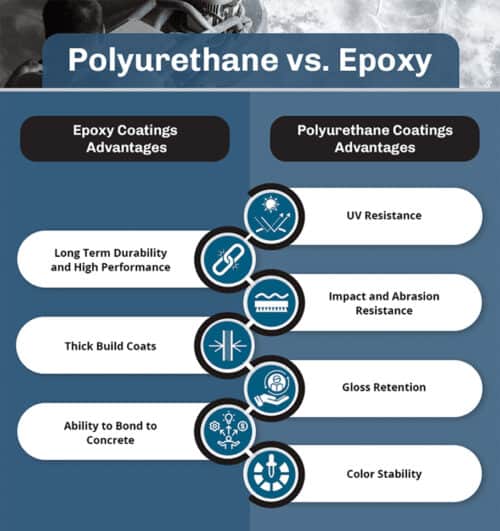Whether you’re undertaking a DIY craft or home improvement project or overseeing a large commercial project, it’s important to understand the nuances between polyurethane and epoxy coatings. These two coatings may seem similar, but each has distinct properties and advantages tailored to specific needs.
There are many uses for epoxy and polyurethane coatings, and selecting the right coating is important for long-lasting protection and performance.
For example, consider a homeowner who is renovating their garage floor. They require a coating that can withstand frequent traffic, spills, and potential oil leaks. On the other hand, an industrial facility manager may be tasked with safeguarding concrete surfaces against corrosion, impact, and harsh chemicals.
In each scenario, the choice between polyurethane and epoxy coatings hinges on factors such as substrate type, project requirements, and environmental conditions. Learning the unique properties and advantages of each coating will help you choose the right solution for your project.
Let’s take a look at these popular coatings, starting with a clear definition of epoxy and polyurethane.
What is Epoxy?
Epoxy is a hard-wearing resin system known for its surface tolerance and adhesion to various substrates. It offers versatility with properties like chemical resistance or fast-setting. Depending on the intended application, you may choose any one of several epoxy options.
Here are some key advantages of epoxy coatings:
- Surface Tolerance: Epoxy coatings excel in adhering to different surfaces, making them ideal for a wide range of applications.
- Ability to Bond to Concrete: Epoxies can chemically and mechanically bond with concrete, making them a preferred choice for coating concrete substrates.
- Durability and Impact Resistance: Once treated with an epoxy resin, surfaces have a harder, more durable surface with impressive impact resistance.
- Thick Build Coats: Thanks to their thickness, epoxy coatings are able to self-level and create smooth surfaces by filling cracks and blemishes.
What is Polyurethane?
Polyurethane is a versatile polymer compound that is commonly used in various applications. It offers a softer alternative to epoxy with remarkable scratch resistance and flexibility, making it ideal for flexible substrates.
Here are some key advantages of polyurethane coatings:
- UV Resistance: Polyurethane coatings are highly resistant to UV radiation, making them suitable for outdoor applications.
- Impact and Abrasion Resistance: They offer excellent protection against impacts and abrasions, maintaining the integrity of the coated surface.
- Gloss Retention: Polyurethane coatings retain their glossy finish over time, enhancing the aesthetic of the coated surface.
- Color Stability: They also provide long-term color stability, ensuring the coated surface maintains its appearance.
Applications and Uses
Both epoxy and polyurethane coatings find applications in various industries and projects. Epoxy offers higher levels of rigidity and adhesion, making it suitable for harder surfaces, like concrete and areas with high physical impacts. Polyurethane, on the other hand, is often chosen for its cosmetic performance characteristics that offer holistic protection for the entire system.

Choosing the Right Coating
When selecting between epoxy and polyurethane for your project, consider the following factors:
- Surface Type: Determine the type of surface you’re coating. Epoxy is ideal for harder surfaces, while polyurethane is better suited for flexible surfaces.
- Project Requirements: Consider the specific needs of your project, such as durability, UV resistance, or aesthetic appeal.
- Cost Consideration: Polyurethane coatings may cost more upfront, but they can offer long-term savings in certain applications.
- Environmental Conditions: Think about the environmental factors your project will face, such as exposure to high traffic or harsh chemicals.
Understanding the unique properties and advantages of epoxy and polyurethane coatings will help you select the right solution for your next project. Whether you prioritize durability, flexibility, or aesthetic appeal, there’s a coating option that suits your needs.
Industrial Epoxy Solutions from Copps Industries
For applications that require significant durability and high performance, epoxy resins are the ideal choice. Since 1979, Copps Industries has been dedicated to providing the finest industrial epoxies in the field. Over decades of experience, we’ve successfully diversified our lineup to offer more than 500 products in 27 countries. Markets we serve include:
- Electronics
- Civil Engineering
- Structural Adhesives
- Aggregate/Mining
We’re dedicated to manufacturing products of the highest caliber at our ISO 9001:2015-certified facilities. Contact us or request a quote today and learn more about our epoxy resin solutions.
